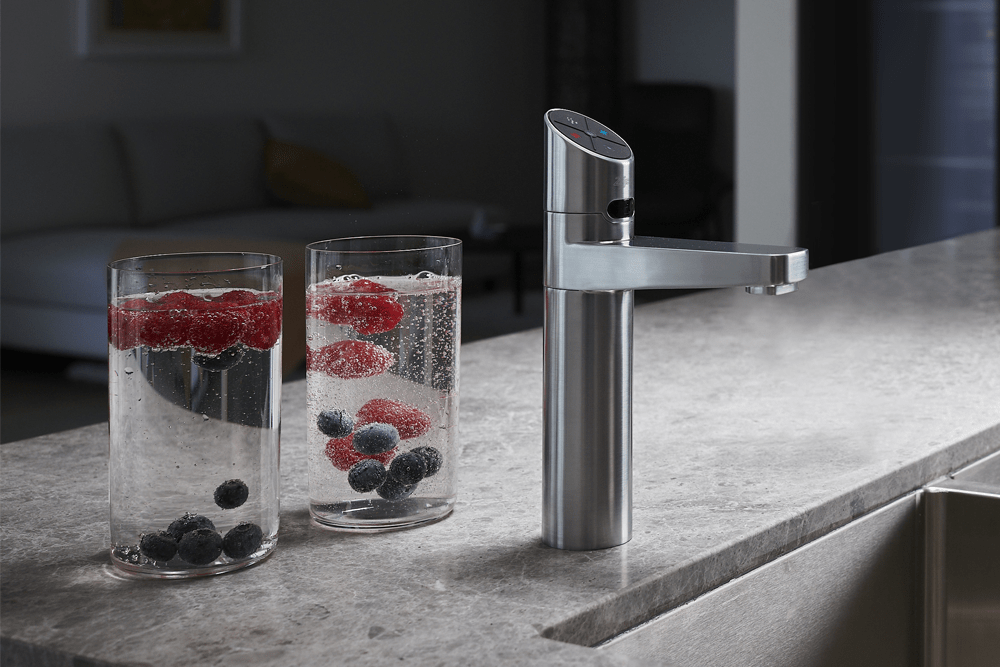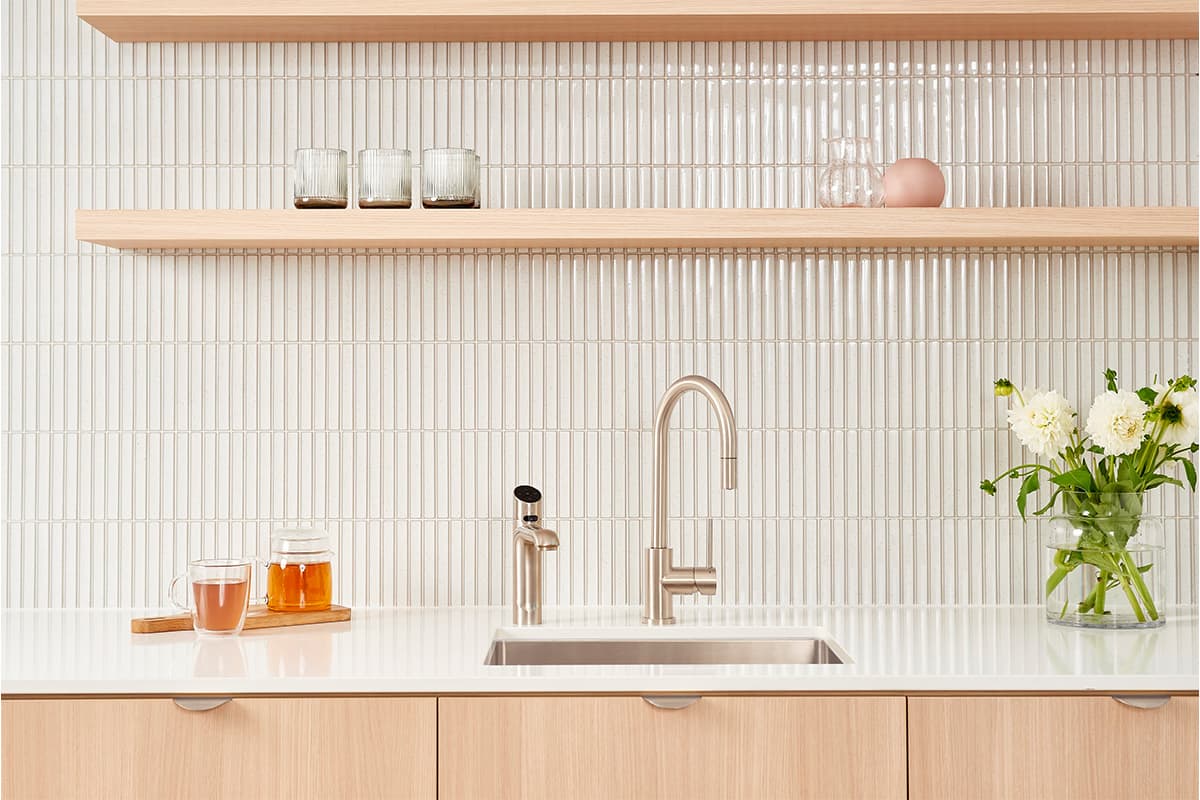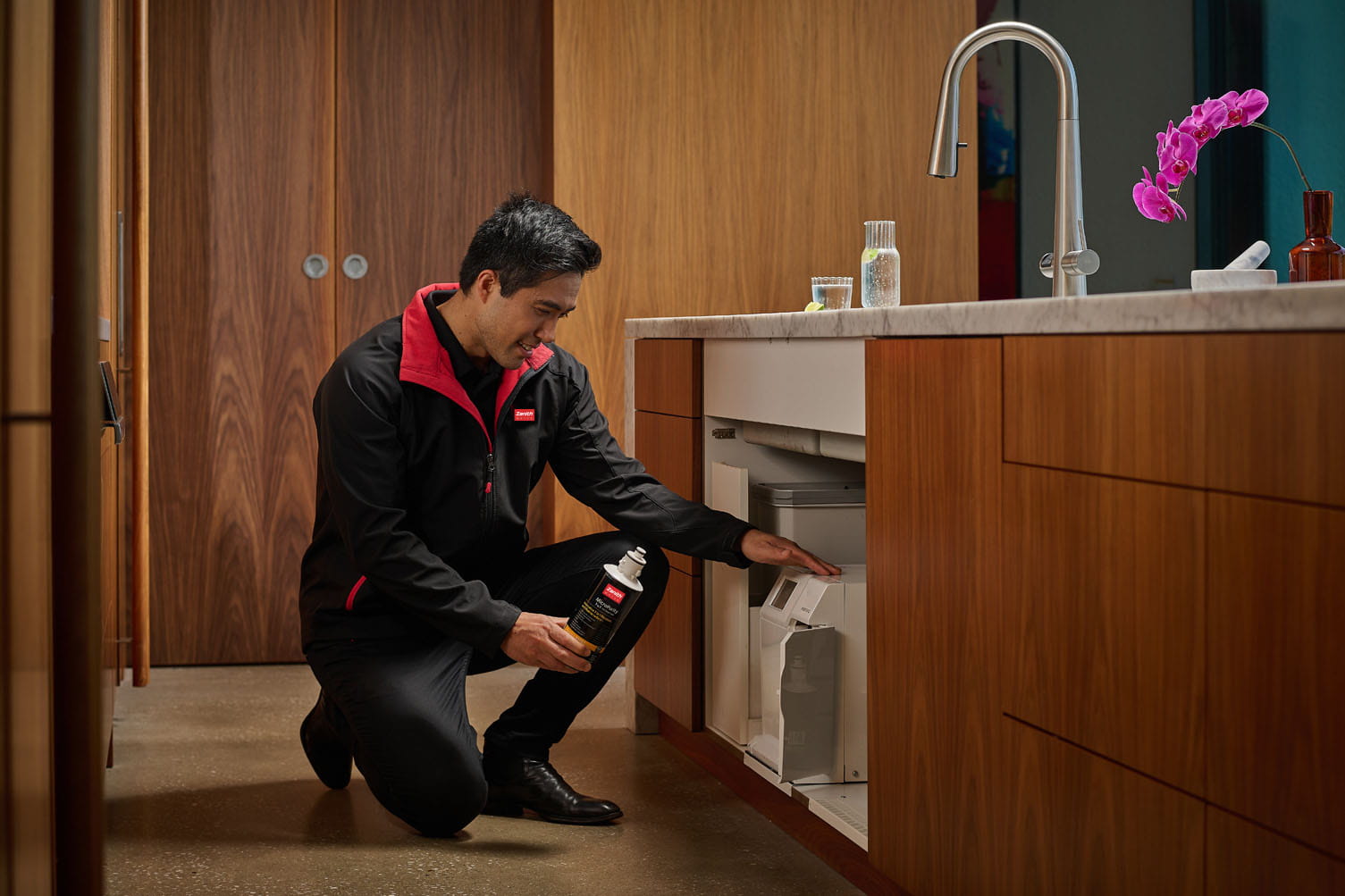Is Tap Water Safe to Drink in New Zealand?
Design | 02-10-25

You turn your tap on without thinking. Maybe to fill a glass or rinse fruit for your kids’ lunchboxes.
We’re lucky in New Zealand – most of us can confidently drink straight from the tap. Our water is among the cleanest and most regulated in the world.
But what’s actually in your glass? Is tap water in New Zealand really as safe to drink as we think?
Let’s take a closer look at what comes out of our taps (and how you can make it better).
We’ll cover:
In this guide to the benefits of drinking sparkling water, we’ll cover:
- Is tap water safe to drink in New Zealand?
- What’s in tap water
- Water quality across New Zealand
- Older homes vs newer homes
- Water filtration
- And some helpful FAQ
Let’s start with the basics: is New Zealand tap water safe to drink?
Is tap water safe to drink in New Zealand?
Yes – New Zealand tap water is safe to drink in most places. It’s regulated under the Drinking Water Standards for New Zealand (DWSNZ) and monitored by local councils, health authorities, and now the independent water regulator, Taumata Arowai. Tap water is routinely tested for bacteria, heavy metals and other known risks, and must meet strict national standards before it reaches your glass.
These standards sit within New Zealand’s broader public health framework and were strengthened after the Havelock North outbreak in 2016, which highlighted the importance of consistent, nationwide oversight.
Today, Taumata Arowai is responsible for enforcing the standards and improving transparency around water safety. But here’s the thing: “safe” doesn’t always tell the full story.
Water quality can still vary depending on where you live, the age of your plumbing, and even how long water has been sitting in the pipes. What comes out of the tap might be legally safe and compliant – but not always what you want to drink.
That’s why it’s worth understanding not just the safety standards, but also what can affect taste and clarity once water leaves the treatment plant.
Let’s look closer at what’s added, what’s removed, and what that means for you.
What’s in our water (and what’s taken out)?
When you turn on the tap, the water looks clean. But even the best-treated water comes with a few invisible extras. Some of them are meant to be there. Others, not so much.
Here’s what you’ll usually find in New Zealand’s tap water – and why.
What’s added (on purpose)
Chlorine
Part of why tap water is safe to drink in New Zealand is because chlorine is added to kill bacteria and viruses. It’s what keeps your water safe all the way from the treatment plant to your tap. But it can also affect how your water tastes and smells.
Fluoride
Fluoride is used to help prevent tooth decay. It’s been in New Zealand drinking water for decades, and it’s supported by every major health body when used at safe levels.
What’s taken out
Before it reaches your glass, tap water is filtered and treated to remove all the usual suspects like sediment, harmful microbes and heavy metals. That’s a big part of what makes New Zealand's tap water some of the best in the world.
But not everything is always filtered out. Let’s talk about two things you might have heard about: PFAS and microplastics.
These are known as emerging contaminants. They’re not new, but scientists are learning more about them and how they show up in our environment.
PFAS
PFAS (short for per- and poly-fluoroalkyl substances) are man-made chemicals used in everything from non-stick pans to stain-resistant fabrics. They’re sometimes called “forever chemicals” because they don’t break down easily – and small amounts have been found in water systems worldwide, including here in New Zealand.
Microplastics
Microplastics are tiny particles that come from things like packaging, clothing fibres, and even bottled water. Some can make their way into waterways and, eventually, into drinking water.
So, can you drink tap water in New Zealand? Yes, you can. Right now, New Zealand’s tap water is still considered very safe to drink. But you can filter your water if you’re concerned or you just don’t want these extras in your glass.
Just remember not all filters are created equal. Zip Water’s MicroPurity filters are certified to reduce PFAS by up to 99.4%*.
They also remove up to 99.9% of other contaminants, including microplastics, chlorine, lead and sediment bigger than 0.2 microns. That’s tiny. Small enough to catch things your eyes can’t see but your body might prefer to avoid.
So while your tap water might already meet national standards, there’s a simple way to make it better.
Does water quality vary across New Zealand?
Yes – water quality does vary, and it’s not just about whether tap water is safe to drink. It’s also about taste, clarity, and trust.
New Zealand’s water is generally excellent by global standards, but where it comes from (and how it’s treated) makes a difference. Here’s a snapshot of how it can change across the country.
Auckland
Most water comes from dams in the Hunua and Waitākere Ranges. It’s carefully treated and safe, but some residents notice a mild chlorine taste.
Wellington
Draws from rivers and aquifers, with treatment plants across the region. Earthquake resilience is a big focus here. Some locals say the taste shifts depending on supply zones and seasonal changes.
Christchurch
Famous for its aquifer-fed water, historically untreated. Since the Havelock North contamination in 2016, Christchurch water is now chlorinated for safety. Many locals still comment on the change in taste.
Hamilton / Waikato
Sourced from the Waikato River. It’s safe and reliable, being filtered and treated to remove impurities like arsenic, which is naturally present in the river.
Smaller towns and rural areas
Supplies vary widely. Some rely on rainwater tanks, others on bores or small treatment facilities. Quality is usually monitored, but taste and clarity can change after heavy rain or drought.
The bottom line? Where you live (or where you’re staying) can change what your water tastes like (and what’s in it). It might be totally safe by the book, but still not quite what you want to drink every day.
Older homes vs newer homes: does it make a difference?
It can. Even if your local supply meets New Zealand’s strict standards, the pipes and fittings inside your home can affect what comes out of the tap.
In older houses, especially those built before the 1970s, galvanised steel pipes were common. Over time, they can corrode and release tiny amounts of metals into the water. Lead solder and older brass fittings can also leach small traces of lead, particularly if water has been sitting in the pipes overnight.
You won’t see it, and you probably won’t taste it. But it can still make its way into your glass.
Newer homes are built with safer materials, but that doesn’t always mean problem-free. Even modern taps and mixers can contain traces of lead or copper, especially if they’re imported or not WaterMark certified. And as any Kiwi knows, a lot of homes have been renovated DIY-style — sometimes with plumbing materials you can’t easily trace.
So what can you do?
If your home is older, you could check your plumbing – especially if you’re renovating or you’re unsure what’s been used. A licensed plumber can easily test your water or inspect your pipes for peace of mind.
If you’re unsure, try running the cold tap for a few seconds each morning before using it for drinking or cooking. This helps flush out any water that’s been sitting in the pipes.
And if you’d rather not think about it at all? A HydroTap can help reduce contaminants like lead and sediment right at the tap. It’s a simple way to get more control over what you’re drinking, no matter how old your plumbing is.
Because safe water isn’t just about the source. It’s also about how it reaches your glass.
Is bottled water a good option?
We all reach for bottled water sometimes. At the airport, in the car, or when you’re caught out on a hot day.
But when it comes to your everyday drinking water at home or work, bottled water might not be the better option.
Let’s start with the facts:
- Bottled water isn’t necessarily cleaner or safer than tap water. Tap water in New Zealand is safe, clean, and held to strict national standards.
- It’s expensive. According to our Aussie counterparts, Sydney Water, one litre of bottled water can cost 2000 times more than the same amount from the tap. You'll find a similar story here in New Zealand
- It’s not great for the planet. Even with recycling, bottled water uses plastic, transport, energy and storage. And the bottles often end up in landfill or waterways.
If you’re buying bottled water because you don’t like the taste or you’re unsure if your tap water is safe to drink, there’s a better way: filter your tap water.
Water filtration: do you really need it?
This one is a personal choice. If your tap water already meets New Zealand standards—and it probably does—you might wonder whether filtering it is worth it. And for some people, it might not be.
But if you want water that tastes better, smells fresh, or gives you peace of mind about what’s actually in your glass, then yes. A good filter makes a real difference.
Why do people choose to filter their water?
For some, it’s about removing chlorine or that faint metallic aftertaste. For others, it’s about reducing exposure to things like lead, microplastics or PFAS – especially if you’ve got young kids or someone in the house is immunocompromised.
And sometimes, it’s just about feeling confident in what you’re drinking. Because “safe enough” doesn’t always mean right for you.
Not all filters are equal
Filter jugs, tap attachments, under-sink systems – they all do different jobs. But the key thing to check is what they actually filter out.
Zenith Water’s MicroPurity system filters down to 0.2 microns. That’s fine enough to catch up to 99.9% of the 8 most harmful contaminants you can't see including microplastics, asbestos and lead – along with 99.4% of PFAS*.
And because it filters your water right at the source, there’s no waiting, no filling jugs, and no second-guessing what you’re drinking.
It’s not just about safety. It’s about experience.
Great-tasting water makes everything better – from your morning cuppa to a glass of water on a hot day. With a Zenith Water HydroTap, you can get filtered boiling, chilled and even sparkling water straight from the tap. No bottles. No clutter. Just good water on demand.
It’s an easy way to upgrade your kitchen—and your water quality—at the same time.
Final thoughts: what does “safe water” mean for you?
We need to be clear: tap water is safe to drink in New Zealand. But safe means different things to different people.
Maybe for you, it’s knowing your water meets national health guidelines. Maybe it’s knowing there’s no lead in the pipes. Maybe it’s about taste. Or trust. Or just wanting the best for your family every time they take a sip.
New Zealand’s tap water is among the best in the world – and that’s something to be proud of. But even with strong systems in place, a lot can still influence the quality of what actually comes out of your tap. Old plumbing. Regional variations. Contaminants we’re only just starting to understand.
That’s why more and more people are choosing to take things into their own hands.
Filtration isn’t about fear. It’s about feeling confident. Making your water as clean, fresh and enjoyable as possible – because you can.
With a Zenith Water system, it’s one less thing to worry about and one more thing done right.
Are you still curious about your water? Learn about the benefits of filtered tap water or discover five easy ways to drink more water.
FAQ: Can you drink tap water in New Zealand?
Is New Zealand's tap water better than bottled water?
In most cases, yes. New Zealand's tap water is held to strict national safety standards and is tested regularly for quality. While bottled water is handy on the go, it’s far more expensive and creates more waste. If taste or trust is the issue, filtered tap water is a smarter everyday choice.
Do I need to filter my tap water?
Not necessarily. It depends on what matters to you. If you’re happy with how your water tastes and you trust your local supply, you may not feel the need to filter. Tap water is safe to drink in New Zealand. But a good filtration system gives you extra peace of mind if you’re concerned about things like chlorine, lead, microplastics or older pipes. It’s also a simple way to make your water taste better and feel more reliable, glass after glass.
* Zenith MicroPurity filters sizes 1 and 1.5 (93701 and 93702) are certified to NSF/ANSI Standard 53 to reduce 99.4% of Total PFAS (average reduction).























